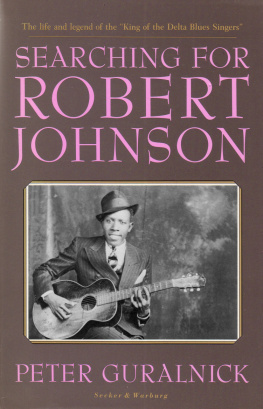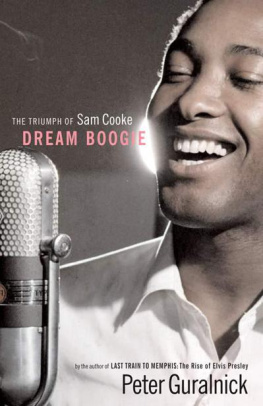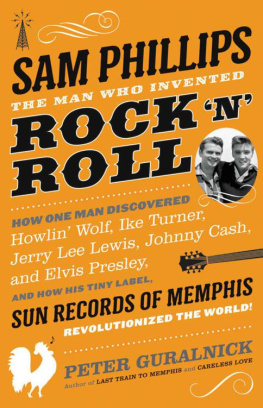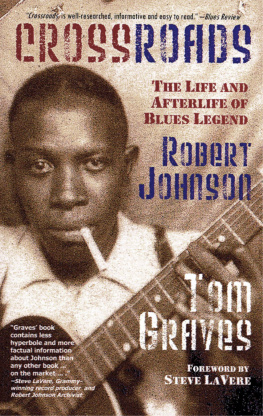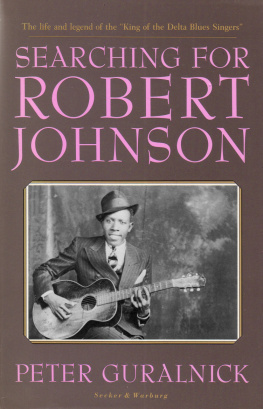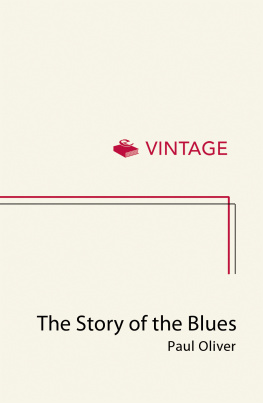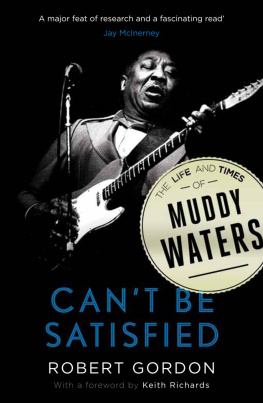FRONTISPIECE: Robert Johnson, ca 1935
COURTESY OF STEVE LAVERE, 1989
First Published in Great Britain 1990
by Martin Secker & Warburg Limited
Michelin House, 81 Fulham Road, London SW3 6RB
Copyright 1989 by Toby Byron/Multiprises
A CIP Catalogue record for this book
is available from the British Library
ISBN 0 436 19999 8
Produced by Toby Byron/Multiprises
Designed by Susan March
Printed in Great Britain
by Redwood Press Limited, Melksham, Wiltshire
W HEN I WAS A FRESHMAN in college, in 1961-62, my most precious possessions were my blues records and a portable stereo phonograph which my mother had uncharacteristically purchased with green stamps. From time to time I read and reread Samuel Charterss pioneering The Country Blues, published in 1959, for its poetic descriptions of a music that seemed as remote as Kurdistan and destined always to remain so. I had perhaps fifty albums of country bluesLightnin Hopkins, Big Bill Broonzy, Blind Lemon Jefferson, Furry Lewisit seemed as if there could scarcely be any more. Names that are as familiar as presidents today, touchstones for anyone familiar with the roots of contemporary music, were the exclusive province of collectors then. My friends and I studied the little that was available, attempted to piece together virtually indecipherable lyrics, pored over each precious photograph, constructed a world of experience and feeling from elliptical clues. Of all the figures who beckoned to us from a remote, mysterious, and foreign pastcertainly it was a past that was not our ownRobert Johnson stood out, tantalized, really, in a way that no other myth or archetype has ever done. Lightnin Hopkins, the first real blues singer I had ever seen live, was, in Charterss words, the last of the great blues singers, but the ethos of Robert Johnson was nowhere near so prosaic. Almost nothing, Charters wrote in a chapter that consisted for the most part of song quotes, lyrical tormented quotes, is known about his life.... He is only a name on a few recordings.... The finest of Robert Johnsons blues have a brooding sense of torment and despair.... His singing becomes so disturbed it is almost impossible to understand the words. The voice and the guitar rush in an incessant rhythm. As he sings he seems to cry out in a high falsetto voice.
What could be more appropriate to our sense of romantic mystery than an emotionally disturbed poet scarcely able to contain his brooding sense of torment and despair? Just as we imagined that Tommy McClennan was mad from the ferocity of his growl, that Blind Willie McTell was the unlikely reincarnation of a latter-day Flying Dutchman with his uncanny ability to turn up in the recording studio at least once in every decade, so Robert Johnson became the personification of the existential blues singer, unencumbered by corporeality or history, a fiercely incandescent spirit who had escaped the bonds of tradition by the sheer thrust of genius. Incredibly, all of this apostrophizing was based solely on Charterss chapter and one recorded selection, Preachin Blues, on which Johnson sounded somewhat thin, constricted, and out of control.
That is why I remember so vividly walking into Sam Goodys on 49th Street in New York, riffling through the blues section with a practiced eye, and discovering to my utter amazement (for there had been no announcement that I knew about; there was no place where you could conceivably read about such things) not one but two altogether unanticipated treasures: Big Joe Williamss Piney Woods Blues on the Delmar label, and Robert Johnson: King of the Delta Blues Singers. I held the records in literally trembling fingers, pored over the notes in the store, studied the romantic cover painting of an isolated, featureless Robert Johnson hunched over his guitar, paid the $2.89 or so that a record cost then, and took the subway back to Columbia without making any of my other intended stops. I probably listened to each record half a dozen times that day.
Sometimes I can evoke the breathless rush of feeling that I experienced the first time that I ever really heard Robert Johnsons music. Sometimes a note will suggest just a hint of the realms of emotion that opened up to me in that moment, the sense of utter wonder, the shattering revelation. I dont know if its possible to recreate this kind of feeling today-not because music of similar excitement doesnt exist, but because the discovery can no longer take place in such a void. Or perhaps there is someone right now who will come to Robert Johnson, or a contemporary pop star, or a new voice in jazz, or some music as yet wild and unimagined, with the same sense of innocent expectation that caused my friends and me to hold our breath, all unknowing, when we first played Robert Johnsons songs on the record player. Let me just quote a passage from Rudi Blesh on which an older generation of blues enthusiastsMack McCormick, Paul Oliver, probably Sam Charterswas nurtured and which expresses, I think, that same sense of pure romantic surrender. It describes Johnsons masterful Hell Hound On My Trail in words that come close to mocking their meaning and yet evoke that same sense of awe I am trying to suggest.
The voice sings and thenon fateful descending notesechoes its own phrases or imitates the wind, mournfully and far away, in huh-uh-uh-ummm, subsiding like a moan on the same ominous, downward cadence. The high, sighing guitar notes vanish suddenly into silence as if swept away by cold autumn wind. Plangent, iron chords intermittently walk, like heavy footsteps, on the same descending minor series. The imagesthe wanderers voice and its echoes, the mocking wind running through the guitar strings, and the implacable, slow, pursuing footstepsare full of evil, surcharged with the terror of one alone among the moving, unseen shapes of the night. Wildly and terribly, the notes paint a dark wasteland, starless, ululant with bitter wind, swept by the chill rain. Over a hilltop trudges a lonely, ragged, bedeviled figure, bent to the wind, with his easy rider held by one arm as it swings from its cord around his neck.
Shining Trumpets: A History of jazz, 1946
Or, as Greil Marcus wrote, only a little more deliberately, in his 1975 Mystery Train: Johnsons vision was of a world without salvation, redemption or rest.... Johnsons music is so strong that in certain moods it can make you feel that he is giving you more than you could have bargained forthat there is a place for you in these lines of his.... Johnsons music changed the way the world looked to me.
Revisionist blues historians sometimes suggest that Robert Johnson is derivative, that what seemed so startlingly original has in fact clear antecedents, that Johnson comes from a strong Mississippi Delta tradition which encompassed Charley Patton and Tommy Johnson who, because they came earlier, must have been greater. All of this seems strangely beside the point to me when compared to the unabashedly apocalyptic effect of the music, the still startling and contemporary vision, the selective artistry of the work.
Robert Johnson has been a constant presence in my life ever since that first long-playing recordof sides that were originally recorded twenty-five years before thatcame out nearly thirty years ago. I can no longer listen as fresh and unencumbered as I once did, obviously, but the music retains its freshness, Robert Johnsons music remains the touchstone against which the achievement of the blues is measured.
The album sold ten or twelve thousand copies in its first ten years of existence, and a second volume came out in 1970 which, while it recapitulated Johnsons greatness, didnt really add to it. It completed the oeuvre, however; all twenty-nine originals along with one alternate take were now released. Primarily through the Rolling Stones and Eric Clapton and their versions of Johnsons Love In Vain and Crossroads in particular, the language of Robert Johnson entered into the common vocabulary of rock. It seems unlikely at this point that there are many people with an interest in contemporary music who are not familiar with one or two of Johnsons tunesDust My Broom, Sweet Home Chicago, Stop Breakin Down, Walkin Blueseven if they are not familiar with their origins.
Next page
